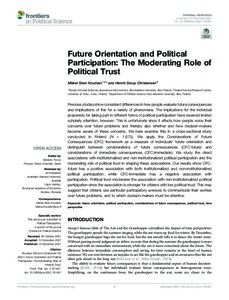Future Orientation and Political Participation: The Moderating Role of Political Trust
Knudsen Mikkel Stein; Christensen Henrik Serup
https://urn.fi/URN:NBN:fi-fe2022012710941
Tiivistelmä
Previous studies show consistent differences in how people evaluate future consequences and implications of this for a variety of phenomena. The implications for the individual propensity for taking part in different forms of political participation have received limited scholarly attention, however. This is unfortunate since it affects how people voice their concerns over future problems and thereby also whether and how decision-makers become aware of these concerns. We here examine this in a cross-sectional study conducted in Finland (N = 1,673). We apply the Considerations of Future Consequences (CFC) framework as a measure of individuals’ future orientation and distinguish between considerations of future consequences (CFC-future) and considerations of immediate consequences (CFC-Immediate). We study the direct associations with institutionalized and non-institutionalized political participation and the moderating role of political trust in shaping these associations. Our results show CFC-future has a positive association with both institutionalized and non-institutionalized political participation, while CFC-immediate has a negative association with participation. Political trust moderates the association with non-institutionalized political participation since the association is stronger for citizens with low political trust. This may suggest that citizens use particular participatory avenues to communicate their worries over future problems, and to which decision-makers must be attentive.
Kokoelmat
- Rinnakkaistallenteet [19250]
